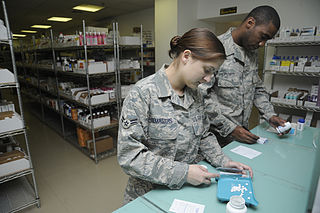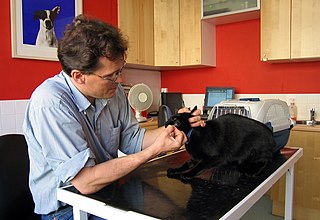Related Research Articles
Technical and further education or simply TAFE is the common name in English-speaking countries in Oceania for vocational education, as a subset of tertiary education. TAFE institutions provide a wide range of predominantly vocational courses.

A registered nurse (RN) is a nurse who has graduated or successfully passed a nursing program from a recognized nursing school and met the requirements outlined by a country, state, province or similar government-authorized licensing body to obtain a nursing license. An RN's scope of practice is determined by legislation, and is regulated by a professional body or council.
A podiatrist is a medical professional devoted to the treatment of disorders of the foot, ankle, and related structures of the leg. The term originated in North America but has now become the accepted term in the English-speaking world for all practitioners of podiatric medicine. The word chiropodist was previously used in the United States, but it is now regarded as antiquated.
A dietitian, medical dietitian, or dietician is an expert in identifying and treating disease-related malnutrition and in conducting medical nutrition therapy, for example designing an enteral tube feeding regimen or mitigating the effects of cancer cachexia. Many dietitians work in hospitals and usually see specific patients where a nutritional assessment and intervention has been requested by a doctor or nurse, for example if a patient has lost their ability to swallow or requires artificial nutrition due to intestinal failure. Dietitians are regulated healthcare professionals licensed to assess, diagnose, and treat such problems. In the United Kingdom, dietitian is a 'protected title', meaning identifying yourself as a dietitian without appropriate education and registration is prohibited by law.

An engineering technologist is a professional trained in certain aspects of development and implementation of a respective area of technology. An education in engineering technology concentrates more on application and less on theory than does an engineering education. Engineering technologists often assist engineers; but after years of experience, they can also become engineers. Like engineers, areas where engineering technologists can work include product design, fabrication, and testing. Engineering technologists sometimes rise to senior management positions in industry or become entrepreneurs.

Podiatry, or podiatric medicine, also known as chiropody, is a branch of medicine devoted to the study, diagnosis, and treatment of disorders of the foot, and ankle. The healthcare professional is known as a podiatrist. The US podiatric medical school curriculum includes lower extremity anatomy, general human anatomy, physiology, general medicine, physical assessment, biochemistry, neurobiology, pathophysiology, genetics and embryology, microbiology, histology, pharmacology, women's health, physical rehabilitation, sports medicine, research, ethics and jurisprudence, biomechanics, general principles of orthopedic surgery, and foot and ankle surgery.

A pharmacy technician performs pharmacy-related functions. Training, certification, licensing, and actual practice of pharmacy technicians varies not only worldwide but in some countries regionally as well as by employer.
The Royal College of Veterinary Surgeons (RCVS) is the regulatory body for veterinary surgeons in the United Kingdom, established in 1844 by royal charter. It is responsible for monitoring the educational, ethical and clinical standards of the veterinary profession. Anyone wishing to practice as a vet in the United Kingdom must be registered with the RCVS.

A surgical technologist, also called a scrub, scrub tech, surgical technician, or operating department practitioner or operating room technician, is an allied health professional working as a part of the team delivering surgical care. Surgical technologists are members of the surgical team. The members of the team include the surgeon, surgeon's assistant, circulator nurse and anesthesia provider. They possess knowledge and skills in sterile and aseptic techniques. There are few mandatory professional requirements for surgical technologists, and the scope of practice varies widely across countries and jurisdictions. Surgical technologists attend junior colleges and technical schools, and many are trained in military schools. In the military they perform the duties of both the circulator and the scrub. The goal is for surgical technologists to be able to anticipate the next move the surgeon is going to make in order to make the procedure as smooth and efficient as possible. They do this by having knowledge of hundreds of surgical procedures and the steps the surgeon needs to take in order to complete the procedure, including the very wide range of surgical instruments they may need. Specialties can include, but are not limited to, the following: genitourinary, obstetrics and gynaecology, urology, ENT, plastics, general, orthopedics, neurology, and cardiovascular. They only work in surgical or perioperative areas and are highly specialized. Surgical technologist is the proper term for a two-year program which earns a degree in applied sciences. The profession is up and coming and highly in demand.

The Australian Qualifications Framework (AQF) specifies the standards for educational qualifications in Australia. It is administered nationally by the Australian Government's Department of Industry, with oversight from the States and Territories, through the Standing Council of Tertiary Education Skills and Employment. While the AQF specifies the standards, education and training organisations are authorised by accrediting authorities to issue a qualification.
An Associate of Science in Nursing (ASN) is a tertiary education nursing degree which typically takes 2–3 years to complete. In the United States, this type of degree is usually awarded by community colleges or similar nursing schools. Some four-year colleges also offer this degree. Students awarded an Associate of Science in Nursing are qualified to sit for the NCLEX-RN and apply for licensure as a Registered Nurse.
Modern medical education in Hong Kong started with the founding of the Hong Kong College of Medicine for Chinese in 1887. Currently, six institutes of higher education are engaged in the training of medical practitioners in Hong Kong.

Nursing in Australia has evolved in training and regulation since the 19th century.
A surgical nurse, also referred to as a theatre nurse or scrub nurse, specializes in perioperative care, providing care to patients before, during and after surgery. To become a theatre nurse, Registered Nurses or Enrolled Nurses must complete extra training. Theatre nurses can focus on different speciality areas, depending on which they are interested in.

A paraveterinary worker is a professional of veterinary medicine who performs procedures autonomously or semi-autonomously, as part of a veterinary assistance system. The job role varies throughout the world, and common titles include veterinary nurse, veterinary technician, and veterinary assistant, and variants with the prefix of "animal health".
Veterinary nurses in New Zealand are represented by the New Zealand Veterinary Nursing Association (NZVNA). Veterinary nurses are professionals in their own right, and as such, not deemed a paraprofessional. Veterinary nursing assistants are paraprofessionals, working alongside veterinary nurses in animal health and welfare.
Veterinary nurses (VNs) in South Africa attend a two-year program at the Onderstepoort campus of the University of Pretoria culminating in a diploma in veterinary nursing [DipVetNurs or DVN ] and unlike lay staff are trained to do everything except clinical consultations and surgery subject to the Para-Veterinary Profession's Act. Qualified veterinary nurses, curiously of both genders, utilize the title of "Sister (Sr.)", similar to the practice of female charge nurses in the human medical field in many countries, representing their professional sisterhood. They can be recognised by the wearing of epaulettes bearing a lamb, representing the patients they care for; a lamp, representing knowledge; and an axe, symbolising strength. They are represented by the Veterinary Nurses Association of South Africa (VNASA) which was started in 1978 after South Africa's first class of qualified veterinary nurses graduated. Permission to offer a Bachelor of Veterinary Nursing through the University of Pretoria was recently applied for to the South African Qualifications Authority; under consideration is the addition of one year of study to the current DipVetNurs program, converting the diploma to a degree. Other veterinary para-professionals found in South Africa include animal health technicians, laboratory animal technologists, and veterinary technologists.

Veterinary medicine in the United Kingdom is the performance of veterinary medicine by licensed professionals. It is strictly regulated by the statute law, notably the Veterinary Surgeons Act 1966. Veterinary medicine is led by veterinary physicians, termed "veterinary surgeons", normally referred to as "vets".
Healthcare professional credentials are credentials awarded to many healthcare practitioners as a way to standardize the level of education and ability to provide care.
Post-secondary qualifications are qualifications typically studied for after successful completion of secondary school. In Mauritius, this is usually after successful completion of the Higher School Certificate or its equivalent, although select qualifications may permit early school leaving or require additional study. A variety of different post-secondary qualifications are offered in Mauritius.
References
- ↑ "The Accredited Vet Nurse Scheme". www.vnca.asn.au. Retrieved 2020-08-20.
- ↑ "AVNAT Registration Scheme now launched!". www.vnca.asn.au. Retrieved 2020-08-20.
- 1 2 "Recognised Qualifications". www.vnca.asn.au. Retrieved 2020-08-20.
- ↑ "Nurses landing". www.vsbwa.org.au. Retrieved 2020-08-20.